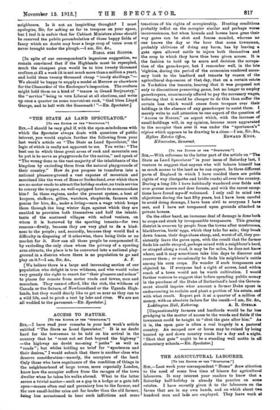"THE STATE AS LAND SPECULATOR."
[To TUB EDITOR or TUB " SPECTATOR."1 should be very glad if, with the open-mindedness with which the Spectator always deals with questions of public interest, you would explain further the following from your last week's article on " The State as Land Speculator," the logic of which is really not apparent to me. You write: "The best use to which these great areas of rock and mountain can be put is to serve as playgrounds for the nation," and speak of "The wrong done to the vast majority of the inhabitants of the kingdom by excluding them from the natural playgrounds of their country." How do you propose to transform into a national pleasure-ground a vast expanse of mountain and moorland like the west of Ross or Sutherland, over which there are no motor roads to attract the holiday-maker, no train service to convey the tripper, no well-equipped hotels to accommodate him P In these regions, under the present system, a host of keepers, stalkers, gillies, watchers, shepherds, farmers with ponies for hire, Sec., make a living—earn a wage which keeps them through the long winter days. against which they are enabled to provision both themselves and half the inhabi- tants of the scattered villages with salted venison, on whom it is bestowed by the sporting tenants—for two reasons—firstly, because they are very glad to de a kind- ness to the people; and, secondly, because they would find a difficulty in disposing of it otherwise, there being little or no market for it. How can all these people be compensated if, by excluding the only class whom the privacy of a sporting area attracts, the place is to be converted into a national play- ground in a district where there is no population to go and [We believe there is a large and increasing section of our population who delight in true wildness, and who would value very greatly the right to resort for " their pleasure and solace" to places far remote from motor roads and towns, men and macadam. They cannot afford, like the rich, the wildness of Canada or the Sahara. of Newfoundland or the Uganda High- lands, but they would dearly like to get as near as they can to a wild life, and to pitch a tent by lake and river. We are not all wedded to the pavement.—ED. Spectator.]






























































 Previous page
Previous page